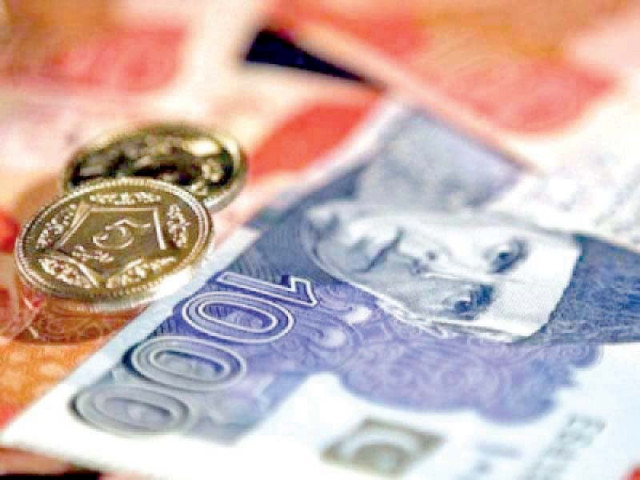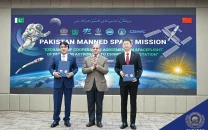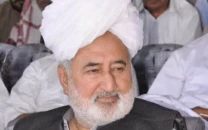Rs410 million approved to deal with PTI march
ECC defers summary for wheat support price, backs cheap electricity to exporters

The Economic Coordination Committee (ECC) on Monday approved an initial budget of over Rs410 million to deal with the participants of the Pakistan Tehreek-e-Insaf (PTI) long march with an iron hand and also backed the decision to provide cheap electricity to exporters.
Chaired by Finance Minister Ishaq Dar, a meeting of the ECC deferred a summary for fixing the wheat support price and instead agreed to first make an effort to convince Sindh to review its decision of setting the support price at Rs4,000 per 40 kilogrammes.
The ECC took up two separate summaries moved by the Interior Ministry to seek budget for dealing with the PTI’s long march. “The ECC approved a supplementary grant of Rs410.2 million in favour of the Ministry of Interior for expenses relating to law and order”, according to the Finance Ministry.
The Rs410.2 million was the estimated cost of preparations to deal with the protestors, including the deployment of a 30,000 strong force, their meal, transportation, anti-riot gear and surveillance of the protestors.
The ECC was informed that in order to maintain the law and order situation and ensure effective security measures, 30,000 out-district law-enforcement agency personnel had been requisitioned for performing special security duties in Islamabad Capital Territory.
The ECC approved Rs259 million for hiring vehicles and containers, Rs35 million for food, Rs31.2 million for fuel cost and Rs18 million for anti-riot gear. Rs2.5 million has been sanctioned for arranging residence of these personnel for five days and another Rs64.4 million for purchase and installation of security cameras and other related equipment.
The PTI has announced a protest in the form of a long march from different cities towards Islamabad Capital Territory. The PTI Chairman Imran Khan has not yet given a final date for the long march but has ordered his party workers to make preparations for mobilisation.
Exporters
In order to keep export-oriented sectors internationally competitive and sustain exports against the backdrop of an economic slowdown, the ECC approved continuation of Regionally Competitive Electricity Tariff for the export-oriented sectors during the current fiscal year.
The Finance Ministry said the ECC decided that electricity might be provided to these secotors at Rs9.99 per unit, all inclusive. It added that five export oriented sectors – textiles, including jute, leather, surgical and sports goods, across Pakistan would be eligible for the package from October 1 to June 30, 2023.
The federal cabinet had approved the provision of cheaper gas till June next year but the decision was subsequently amended due to the IMF’s objections on the subsidy without providing funds in the budget. However, Finance Minsiter Ishaq Dar last week announced to restore the subsidy package.
The ECC approved to clear the pending liabilities of Rs33 billion and also gave financial commitment to cover the cost of the subsidies till June next year. The Power Division will separately move a summary to seek the supplementary grant for the exporters.
The ECC deferred a summary that had been moved to fix a profitable price of the next wheat crop for the farmers. But the matter was postponed.
The provincial cabinets of Punjab and Khyber Pakhtunkhwa have already approved the wheat support price of Rs3,000 per 40 kgs. The government of Balochistan has not announced the rate till date but the Sindh cabinet has announced the support price of Rs4,000 per 40 kgs.
A Cabinet Committee had met with the Chief Minister Sindh with request to review the MSP but no decision was made. The federal government is of the view that fixing the wheat support price at Rs4,000 would significantly increase inflation and Passco may also not be able to procure wheat from Sindh, while other provinces may impose a ban on the movement of wheat across borders.
The growers and middleman will use the price disparity amongst provinces to distort the market and hoarding and smuggling is likely to occur. The Pakistan Bureau of Statistics (PBS) has reported the average local wheat price at Rs2,776.
The ECC was informed that in case of the proposed minimum support price of Rs3,000, the inflation would inch up by 1.27, which will further escalate by 2.9% in case the price is fixed at Rs4,000. The Food Ministry had recommended Rs3,000 price aimed at providing a profit margin of 20% to growers or at Rs3,200 to provide 28% profit.
The Food Ministry also presented a summary to use Gwadar port and revision of procedure for the pre-shipment inspection agency for the import of wheat. The ECC was informed that the reasons for higher price in limited bids received, in a tender dated 26th September, 2022, was increased risks due to change in inspection regime and port.
In view of the higher cost on import of wheat associated with the two proposals, the ECC approved the proposal that both amendments to TCP tender inspection might be dropped for the time being. However, pre-shipment inspection should be ensured at the loading port from the top four inspection firms by TCP/Ministry of Commerce. TCP was also directed to issue fresh tenders to ensure import of the allocated quantity of wheat.



















COMMENTS
Comments are moderated and generally will be posted if they are on-topic and not abusive.
For more information, please see our Comments FAQ